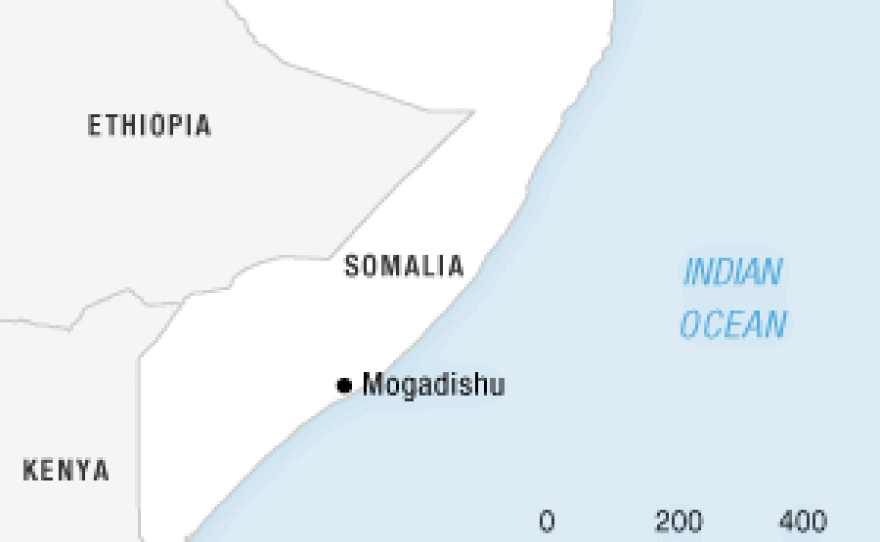Final of four parts
The morning flight from Nairobi banks over the Indian Ocean and descends toward a runaway next to the beach. Waves crash and wind whips through sand dunes dotted with pockmarked buildings.
An abandoned jet lies near the edge of the runway with a broken wing.

The pilot comes on the intercom: "Welcome to Mogadishu, ladies and gentleman," he says. "The time now is 9:25."
So begins a four-day trip to one of the world’s most dangerous cities.
Mogadishu is the capital of Somalia, a country on the Horn of Africa that’s been embroiled in civil war for nearly two decades. Radical Islamists named al-Shabab are locked in a grinding battle with African peacekeeping troops.
Trapped in the middle are Somali civilians, just trying to stay alive amid the violence.
I'm traveling with a group of journalists -- guests of the African Union. The African Union has more than 7,000 troops here, defending a weak U.S.-backed government.
The soldiers say they’re pushing al-Shabab back and want to show off new forward bases. Before we head into town, our host, Ugandan Army Maj. Barigye Ba-Hoku, has this advice for our mostly white group: "Generally speaking, people of your complexion are targets for these idiots here. So, when we sit in our convoys, try as much as you can not to overexpose yourself. All right?"

Wearing flak jackets and helmets, we board hulking, armored personnel carriers -- paid for by the U.S. government. The vehicles pull up to the edge of the heavily guarded African Union military base and launch into what feels like a road rally through the streets of Mogadishu.
The armored personnel carriers blow past palm trees and weave through Jersey barriers, kicking up trash in their wake.
There's not much shooting today, so people are selling fruit by the roadside beneath brightly colored umbrellas. A militia man allied with the government lounges in a plastic chair, a bandolier of bullets draped over his shoulders.
The vehicle is going at least 50 miles an hour. The reason is simple: The African Union does not want to offer al-Shabab a stationary target.
When the driver slows for a donkey in the road, he blasts his horn and then races ahead.
The high-speed tour of Mogadishu does not include famous landmarks that inspire national pride. Instead, it's filled with what used to be -- and places where terrible things happened.

Ba-Hoku points out the old U.S. Embassy, but you'd never recognize it. It's a collection of crumbling, sun-bleached buildings overgrown with brush.
He notes the Sahafi Hotel, not because of the service, but because two French security advisers were kidnapped there last year.
Eventually, we make our way back to the airport's concrete gate.
It's cracked and bears burn marks from a suicide bomb attack last month. African Union troops stopped the bombers, but not before they killed nine people, including two soldiers.
The African Union has set up hospitals to care for Somali civilians -- a popular service in a city where most hospitals closed long ago. By 7:30 on a Saturday morning, scores have lined up for help at an African Union Clinic. People with metal detectors check each patient for guns or bombs.
Among the neediest are children who've been caught in the crossfire.
An 11-year-old boy named Abdu was shot coming out of a mosque. He lies on a bed, his blue T-shirt pulled up over his chest. There is a gaping incision in his abdomen, which doctors opened to remove a sniper’s bullet.
Abdu's father, who waves a reed fan to shoo flies off his son, says the sniper was with al-Shabab. The boy moans in pain, unable to speak.
On the other side of the room is Howa Mudi, a 10-year-old girl with a brilliant smile. About three weeks ago, a mortar landed on her house, killing two of her siblings.
Howa was injured so badly, doctors had to amputate most of her legs.
Her father says he doesn't know who was responsible.
To record Howa in the noisy hospital ward, I use a special microphone that vaguely resembles a gun. She stares at it in horror and begins to shake.
Only when a doctor takes hold of the mic does Howa relax.

"I'm unlucky," she says. "When I grow up, I don’t know what I'll do, because I don't have any legs."
Howa lost an older sister named Faduma in the attack. "Sometimes, when I sleep at night, I have dreams. I play with my sister," she says. "Then I wake up. This is my biggest problem."
Mogadishu was not always like this. In the 1960s and 1970s, it was a haven for tourists who came for the beaches and blue-green waters that resemble the Mediterranean.
People called it the Pearl of the Indian Ocean.
Occasionally, amid the rubble, you can still catch glimpses of the city that once was -- a city that people in Mogadishu hope one day they'll see again.
Copyright 2022 NPR. To see more, visit https://www.npr.org. 9(MDAzMjM2NDYzMDEyMzc1Njk5NjAxNzY3OQ001))







